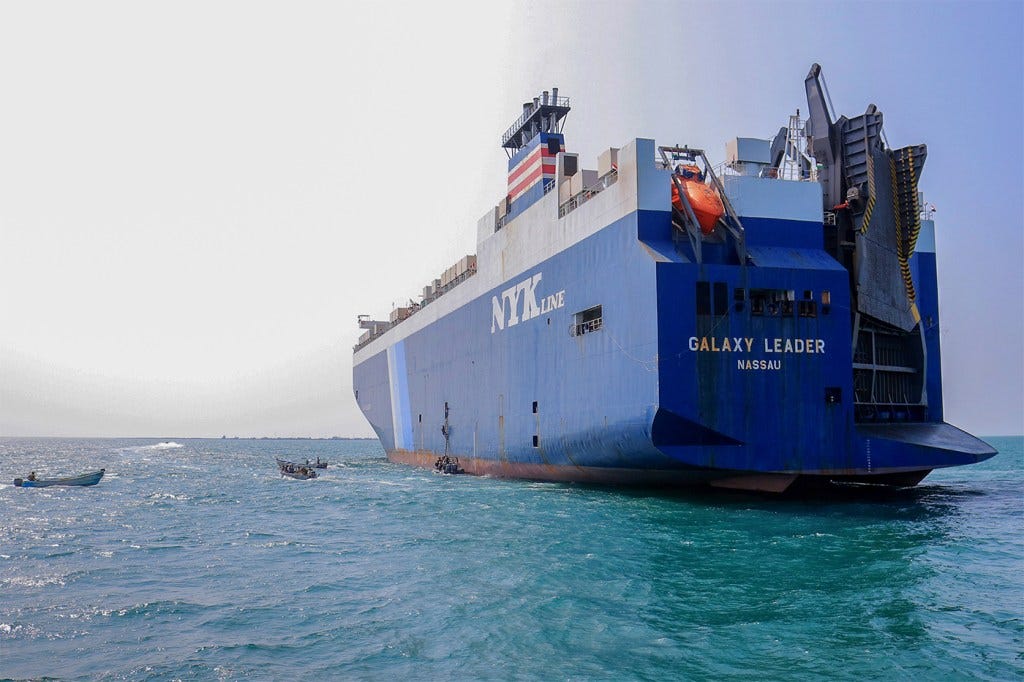U.S. Airstrikes in Houthi-Controlled Areas of Yemen
Escalation in the Middle East: U.S. Airstrikes on Houthi Strongholds in Yemen.

U.S. Airstrikes on Houthi Strongholds in Yemen
On October 17, 2024, U.S. Secretary of Defense Lloyd J. Austin III announced a significant escalation in U.S. military involvement in Yemen, with airstrikes targeting Houthi-controlled areas. These strikes mark a critical point in the ongoing conflict, which has seen an increase in Houthi attacks on commercial and military vessels in the Red Sea and Gulf of Aden since January 2024. The impact of these developments on global trade and maritime security has drawn international attention.
Background: Houthi Threats to Maritime Security
The Houthi rebels, an Iranian-backed faction in Yemen, have posed a growing threat to international shipping routes in the Red Sea and Bab-el-Mandeb Strait. Their attacks, primarily targeting civilian and naval vessels, have severely disrupted maritime traffic, affecting approximately 15% of global seaborne trade. A notable incident involved the hijacking of the Galaxy Leader, a roll-on/roll-off vehicle carrier, highlighting the rebels' capacity to seize large vessels and hold their crews hostage1. In response, the international community, particularly the U.S. and its allies, has intensified efforts to secure these critical waterways and protect global trade.
U.S. Airstrikes and Strategic Objectives
The U.S. airstrikes, carried out with both aircraft and naval assets, targeted several underground facilities believed to store weapons used by the Houthis to attack global maritime traffic. Key targets included Sanaa, the Yemeni capital, the port of Hodeidah, and strategic areas in the Dhamar and Bayda provinces. Secretary Austin underscored that the primary goals of these strikes were to degrade the Houthis' ability to continue their assaults and to safeguard freedom of navigation in one of the world's most crucial maritime corridors.
Austin's statement highlighted the U.S. commitment to protecting global trade and ensuring the safety of maritime routes, reiterating that neither the U.S. nor its partners would tolerate attacks on their personnel or allow any actor to endanger international waterways.
Regional and Global Implications
The airstrikes occurred against the backdrop of a broader escalation of tensions in the Middle East, with the Israel-Hamas conflict in Gaza and increased hostilities between Israel and Hezbollah in Lebanon. Houthi officials have vowed to continue their operations, including alleged drone assaults on Tel Aviv, positioning their actions as support for the Palestinian cause.
International reactions to the strikes have been swift, with President Biden stating that the U.S. is prepared to take further measures if attacks on maritime routes persist. The growing tension has raised concerns about the potential for broader conflict in the region, with significant implications for global trade through the Red Sea and Gulf of Aden.
Earlier Israeli Airstrikes on Yemen
Earlier, on Sunday, September 29, 2024, Israel had launched a large-scale aerial assault on Houthi-controlled targets in Yemen, marking a dramatic escalation in the ongoing conflict between Israel and Iran-backed groups such as Hezbollah and the Houthis. This intensifying conflict now spans multiple fronts, with several actors and regions involved. The hostilities include fierce military engagements between Israel and the Houthi militia in Yemen, ongoing Israeli airstrikes on Hezbollah strongholds in Beirut and southern Lebanon, and continued clashes with Hamas in Gaza. Since the Israel-Hamas war began almost a year ago, the violence has spread across the region, raising concerns about a broader, multi-front conflict that could further destabilise the Middle East, involving Iran-backed factions on multiple fronts. The following sections highlight key developments in this unfolding crisis.
India's Role: A Strategic Contributor to Maritime Security
Amidst this escalating crisis, India has emerged as one of the key players in maintaining regional stability. The Indian Navy, though not directly involved in the U.S.-UK military actions, has significantly increased its presence in the Gulf of Aden and the Western Arabian Sea. The Indian Navy's primary focus has been on anti-piracy and anti-hijacking operations, contributing to the safety of maritime routes in the region.
India's naval operations, code-named 'Op Sankalp,' have seen the deployment of 12 warships and over 5,000 personnel, reflecting the country's commitment to maintaining security in international waters. Since December 2023, the Indian Navy has responded to 18 incidents, rescuing hijacked vessels and crews. These efforts have been instrumental in ensuring the safety of both Indian and international merchant vessels, affirming India’s position as a 'First Responder' in the Indian Ocean Region.
Impact of India's Naval Operations
The scale and effectiveness of India's maritime efforts are evident from the outcomes of 'Op Sankalp.' The Indian Navy has not only safeguarded vital shipping lanes but has also rescued over 110 seafarers, including 45 Indian nationals. Their operations have also involved escorting critical commodities and seizing large quantities of narcotics, further contributing to regional security.
India's role as a stabilising force in the Red Sea and surrounding areas is widely recognised, and its proactive approach has been crucial in ensuring that global trade routes remain open and secure. This reflects India’s growing influence as a responsible global player committed to upholding international law and maritime security.
Summing Up: A Complex and Fluid Situation
The situation in the Middle East remains complex, with the Houthis vowing to continue their operations and the potential for further escalation still present. The international community, led by the U.S. and its partners, is actively monitoring developments, aware of the significant impact these tensions could have on global trade and regional stability.
India’s strategic and humanitarian contributions, however, offer a ray of stability in an otherwise volatile region. As the situation unfolds, India's involvement in safeguarding maritime security underscores its commitment to upholding peace and security in the international domain, earning it the recognition as a reliable partner in the Indian Ocean Region.
The Galaxy Leader, a roll-on/roll-off vehicle carrier, was hijacked by Houthi rebels in November 2023 in the Red Sea. The ship, owned by Galaxy Maritime Ltd. and operated by Nippon Yusen, sails under the Bahamian flag. Its 25 crew members, from various countries, have been held hostage since the incident. Despite visits from the International Committee of the Red Cross and ongoing diplomatic efforts, the crew remains in captivity, highlighting the persistent maritime security challenges in the region.





